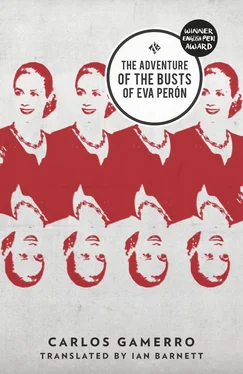One by one the participants opened their eyes, rubbed them as if they’d just woken up, and looked about, puzzled, self-conscious, as if returning from a long journey. What exactly was it they’d just experienced? All of them except little old Fernández, that is, who’d fallen asleep during the exercise and was gently snoring, his head lolling over the back of the chair. A couple of shakes and he was awake.
‘Well? How do you feel?’ Marroné asked cheerily.
‘Good, good,’ some answered, while others nodded their approval.
‘Did anyone see or feel anything they’d like to share with the rest of us?’
They exchanged the usual ‘who’s going first?’ glances.
‘Well, I…’ began the woman who had joined the group just before the exercise, a tanned thirty-something in a tailored blue suit and peach blouse. ‘When I opened the cast, there was like this light coming out of Eva’s eyes. And out of her mouth, and her ears as well. There was like this light streaming out of her. What does it mean?’
‘Hold that image for now. It’s important. We’ll come back to it later,’ he said, nimbly sidestepping the claptrap. ‘Anyone else?’
‘The worker had my father’s face,’ piped up González, his voice about to crack. ‘He died two years ago,’ he explained. Ramírez gave his shoulder a firm squeeze and González pressed his lips together and nodded several times in thanks.
‘It was beautiful,’ ventured Dorita, gazing at him with wide eyes, in which welled two deeply emotional tears, like spilt water reaching the table’s edge. ‘It had never occurred to me to actually go to the workshop and see what we make in this factory.’
‘That’s it!’ Ramírez the rebel addressed his comrades, now highly motivated after the exercise. ‘Let’s go there right now! Let’s join our brother workers!’
‘How about this?’ Marroné joined in, mentally rubbing his hands. ‘What if I go down there now and have a word with them? If they agree to lift the restrictions on production in the interests of shop floor — office unity and to make an exception for Comrade Eva, we can get to work after lunch. Meanwhile, you can divide yourselves into two groups and suggest new ways to creatively and — why not? — entertainingly tackle the predicament we find ourselves in.’
‘Like falling off a log,’ Marroné thought to himself on his way down in the service lift, accompanied by one of the black-helmeted commissars, who gestured vaguely towards the gate and answered his question about who the leaders were with an ‘Anyone in a white helmet’. On the way he came across three green-helmeted workers heading for the canteen and shouldering half a side of beef, a bulky sack of bread rolls and a crate of oranges; one worker in a red helmet and kitchen apron; and two in yellow helmets, twirling brushes and mops; the guards, he noticed, all wore black helmets. The strikers were clever: instead of doing away with the colour coding and letting everyone merge into chaotic egalitarianism, they had kept the coloured helmets but changed their meanings. A prime example of the efficient reallocation of existing resources.
Above the replicas of Michelangelo’s Moses and David that guarded the entrance they had hung a white sheet with an inscription painted in broad red brushstrokes: ‘Factory Occupation — Day 2’. The front gate and adjacent areas were a hub of feverish activity: the patrol cars of the night before had been joined by two assault vans and even a water cannon, and the uniformed police by another twenty-odd men, sporting the helmets and batons of riot police. A crowd milled about in the free space, brightening the work-day monochrome with holiday colours: the lorries and vans of the suppliers bringing in victuals for strikers and hostages were joined by paper-boys touting their newspapers at the tops of their voices; the strikers’ wives and girlfriends had come, children in hand, with clean clothes and packed lunches, and exhorted their husbands not to give up the fight; street-hawkers wandered through the crowd peddling cigarettes, lighters, razors and razor blades, batteries, packs of cards and other trinkets; at one end of this seething human mass a choripán stall had begun to smoke and sizzle; a popcorn seller and an ice-cream seller were stationed at the other, and two Bolivian cholas had parked their stately anatomies on either side of the gate — one selling fruit and veg, the other ladies’ underwear. There were also two press units — one from Canal 13, another from Radio Mitre — as well as a swarm of journalists, who tried to force their way inside every time one of the gates opened. After studying this colourful animated tapestry for a while, Marroné found what he was looking for: at the north corner of the factory a throng was gathering, in which the brightly coloured helmets stood out against the shade of the trees like Smarties on the icing of a cake. Marroné took a deep breath and set off to join it.
4. The Proletarian Bourgeois
In the ghostly shade of a plaster-shrouded ombú his old acquaintance Baigorria addressed his comrades from a wooden crate. Not a white helmet in sight.
‘Comrades… We are living a historic moment here at the Sansimón Plasterworks… Our occupation has been a huge success… We’ve shown the bosses what we can do, and if we did it once we can do it again… But the fact is, comrades, if we keep this up we’re playing straight into the management’s hands. The storehouses are packed to the gunwales with goods going nowhere; you know that better than me. This strike’s a godsend to them: they can stop production and not pay us a cent. I want to believe — want to believe — that those insisting on continuing this occupation are acting in good faith, thinking they’re doing what’s best, but it wouldn’t be the first time they’ve pulled a fast one on us, comrades, that those who say they’re our friends turn out to be at best useful idiots and at worst management spies, not to mention our old friends the infiltrators, those wolves in workers’ clothing…’
Marroné was truly impressed. Garaguso the personnel manager wasn’t just quick, he was subtle — Machiavellian even. In a matter of hours he had not only won over one of the strikers to his cause, but had turned Baigorria into a skilful orator capable of ensnaring his listeners unawares. Marroné felt like going up to him and giving him a few tips on making the most of body posture, auditorium layout and, above all, lighting, but some of his listeners had started speaking their minds.
‘Shut it, scab! You blackleg bastard!’
‘How much is Garaguso paying you, you fucking sell-out?’
‘Go back to Babirusa, you turncoat!’
Imperturbable, Baigorria tried to go on with his speech.
‘Comrades, comrades! Don’t get me wrong. I’m not saying the occupation was a mistake, I’m not saying we should back down. I’m saying enough’s enough, that we’ve got what we wanted. There’s a time to sow and a time to reap, and if we don’t gather it in time, what happens to the harvest, comrades? It rots! If we go on with this occupation, we’ll gain nothing else and might lose all we’ve gained so far. The only thing we’ll achieve is more wholesale firings and a small rise at most for those who stay on. So if you’re willing to pay that price, then go ahead! You, Pampurro… Will you enjoy your match tickets knowing they’ve taken food from the mouths of Alfieri’s hungry children? And you, Zenón, will you enjoy buying your wife that new dress knowing El Tuerto will be forced to work as a rag-and-bone man again?’
Out of reflex Marroné had already seized his notebook and quickly jotted down the names — ‘Pampurro… Alfieri… Zenón… El Tuerto’ — adding the essential aide-mémoires, and so bent on his task was he that he didn’t react when a voice at his back exclaimed:
Читать дальше











